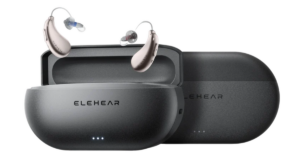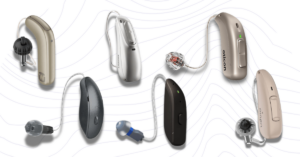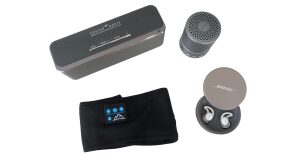If your doctor has ever suggested that it may be time for hearing aids, you’ve likely found yourself lost in a maze of information as you navigate options, price points, and brands. Fact is, hearing aids are a major health decision – and the abundance of available varieties can be overwhelming.
What Exactly Is A Hearing Aid?
Most simply stated, hearing aids are little computers to improve your ability to hear. They include a microphone (to pick up sound), a speaker (to transmit sound), and some infrastructure like computer chips and a battery to keep the whole operation running smoothly. And like buying a computer, devices range from cutting edge, deluxe systems, to models that are a bit more durable and mainstream. Some higher price aids may provide better sound quality and include more sophisticated features for noise reduction, as well as better warranties and other audiology services like fittings, follow-up appointments, and general maintenance.
On the other end of the spectrum are more basic devices that can be purchased over-the-counter and include far fewer bells and whistles.
Why Do Hearing Aids Cost So Much?
All of these features come with a price tag. At anywhere from $2,000 to $7,000 per pair, hearing aids are a big investment.
These turbo-charged electronics are incredibly intricate, with a lot of research and development invested in making them especially savvy and nimble. Most devices also do more than just amplify sound; they can leverage sound therapy to address tinnitus, and offer advanced processing of sound to address other auditory issues like understanding speech in background noise. Also, the cost of many devices is padded to cover professional audiology services, maintenance fees, and general support.
Does Insurance Cover Hearing Aids?
Sometimes, but not regularly.
Like vision coverage, many plans have a designated dollar amount (a cap) they contribute, rather than a percentage or general deductible to meet before providing the remainder of the costs. And again, like vision care, the contribution is typically a one-time amount over a particular period of time. Moreover, routine hearing aid checks or general maintenance costs aren’t always covered.
It’s also important to keep in mind that Medicare does not provide any coverage for hearing aids, which comes as an unpleasant surprise to many people new to the program. That’s where supplemental insurance can be valuable, as well as pre-tax programs like HSAs or FSAs that offset health costs.
If I Need Hearing Support, Should I Select A Bundled Or Unbundled Insurance Plan?
Because American healthcare is rarely as straightforward as we’d like, this quirk of insurance is worth unpacking.
In bundled healthcare, audiology services are generally included in the cost of hearing aids and covered by insurers. That total cost includes the initial cost of the device, warranties, and check-ins with your clinician. On the plus side, this bundled plan encourages better integration of services and a higher likelihood that patients will connect with their doctors to ensure the devices (and their ear health) are in good shape. The comprehensiveness of the coverage, however, can also be a drawback since you may or may not actually need or utilize the high level of care, thus you may be paying for services you don’t use.
The increasingly popular unbundled model is more of a pay-as-you-go arrangement, wherein you’re only paying for services you use at the time of use. In this scenario, the initial cost of the device is often much lower, but does not include follow-up visits, fittings, or other potentially necessary clinical encounters. There’s certainly a chance those services may be provided as a price-fixed option that’s packaged and priced accordingly, but it’s not a guarantee. That said, when you begin the process of getting hearing aids – especially the first time – it’s hard to know the extent of services and follow-up needs you may have, and a piecemeal approach to paying for those services can add up quickly.
What About Over-The-Counter Models?
The FDA has approved over-the-counter options for hearing aids, which may be worth considering if you’re finding the need for light and periodic hearing assistance. While these are easy to access since they don’t require professional referrals, fittings, or maintenance, it’s also important to keep in mind that using these devices means you won’t be getting professional device support. You also may be more overwhelmed in trying to select hearing aids from all the available choices of devices being sold direct-to-consumers, without the aid of a clinician. That doesn’t mean an audiologist or other physician can’t be a resource to monitor changes and improvements in hearing as a result of the aids, they just won’t be able to administer the same level of customization of the device as you’d get with a prescription model.
The Takeaway
Like all health decisions, we always encourage you to talk to your doctor first. All models of hearing aids have their benefits and drawbacks, as do the means for financing these important medical devices. Your doctor can be a great ally as you purchase and monitor the effectiveness of whatever you choose. If you are interested in seeing in depth reviews on specific hearing aids, click here!











